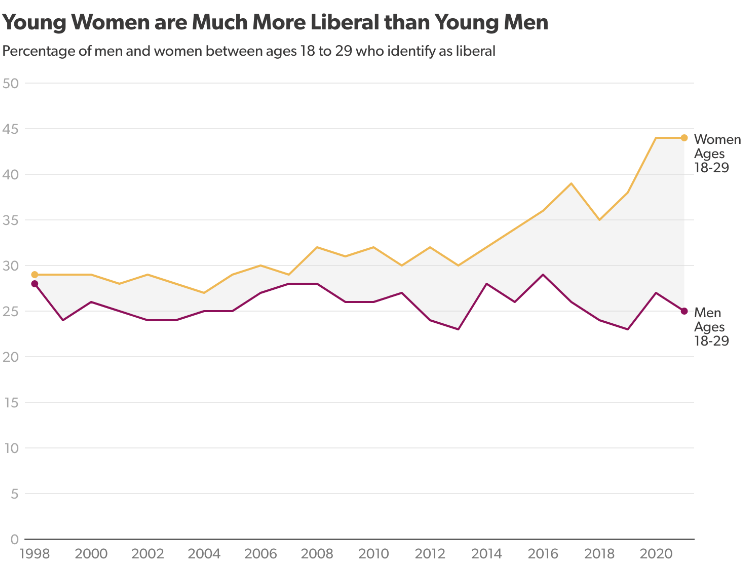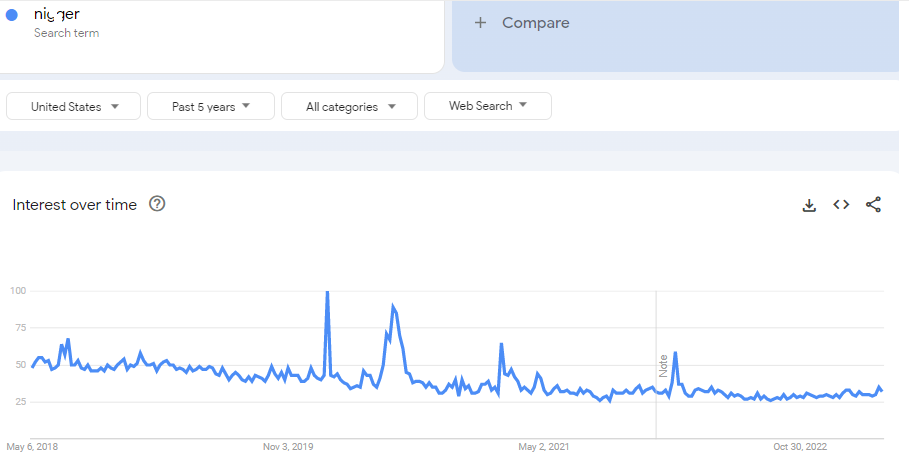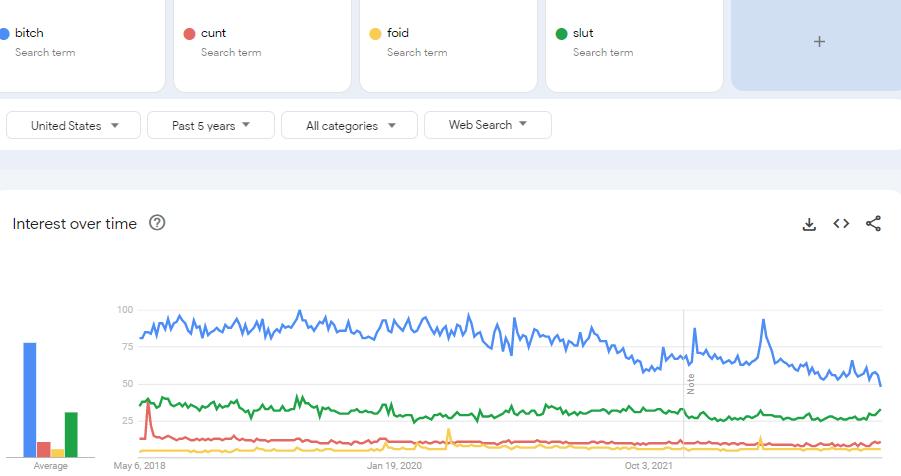Keith Woods has recently published a piece arguing that we are heading for a new wave of radicalization. In it, he points out 6 contributing factors towards:
The Tate effect. Tate is currently the most popular influencer on the internet, who pushes people in the direction of misogyny and radicalization.
The Elon effect. Elon bought twitter and is currently more relaxed on censoring content than the previous owners.
The rise of alt-tech has put pressure on other platforms to reduce censorship and improve their product.
People are pushing back against the trans stuff. 2/3 people are against them competing with others of their desired gender, and most say gender is determined at birth, which is increasingly becoming the popular opinion.
Obama effect. Some people viewed the alt-right as a reaction against the Obama presidency, so they think that 5 more years of governance by the Democratic party would result in another reaction.
Black fatigue. Scott Adams has become the latest noticer of greater Black crime and resentment towards Whites, which has made him the focus of a lot of a lot of attention from both the right and the left.
Out of these arguments, I find it to be a good case for a potential resurgence of the online right, but I find there to be some holes in his argumentation.
First of all, I can’t see what people find so alarming or attractive about Andrew Tate specifically. I look at his twitter feed and it’s all noise and sensationalism, none of the misogyny that is supposedly out there. His profession, on paper, is being a webcam executive who dodges taxes and likes scamming people. Honestly, who the fuck cares? There are tons of these kinds of people, but none of them get the exposure Tate gets. Then you turn to see his most provocative clips and it’s just typical shock humor and reheated manosphere content - some of which is pretty good:
What I find more intriguing is the people who orbit him - SNEAKO, who recently claimed that Japan’s homogenity was a key to its success, justpearlythings, who came out against women voting and had Nick Fuentes on her show, fresh and fit, which had a literal rapist on their podcast... Pretty wild group of people. I’m honestly lost as to how the glob has decided to cover some weird porn producer instead of his deranged (and maybe a little based) orbiters, who all are extremely popular (400K+ on twitter/YT) and radical. This is why I think all of the attacks calling him a misogynist fall very flat. Not necessarily because they are wrong, but because he is not the one that is promoting the hatred of women. It’s his followers and the people he does content with who do so.
If you look at polling, 1% of young women like Andrew Tate, while 46% of young men do. A social trend that may start replicating across countries is a growing political divide between young men and women. In Korea, old people vote conservative, middle agers vote liberal, young men vote conservative, and young women vote liberal.
I suspect this has to do with declining TFR levels - Steve Sailer noted decades ago that one of the strongest predictors of Republican turnout was family formation, whether it is marriage rates or affordable housing. I have another thing to add: that family formation has a uniquely strong association with the female vote. If you look at demographic data, being married seems to be more strongly associated with Conservatism within women, so a causal effect would entail that a declining rate of family formation causes women to vote for left-leaning parties. This trend of increasing gender polarization starting to show up in the United States, where young women and men are increasingly separating in their political views. Of course, correlation =/= causation, but at the moment I don’t see any other plausible theories.
What we have on our hands might not necessarily be a growing radicalization, but a growing separation between men and women in their political views.
Keith Woods is right about alt-tech being surprisingly successful, though they are still dwarfed by youtube and twitter in visibility. For example, despite the fact that telegram has a fairly active userbase, twitter is still searched for about 17 times more than telegram. What I think is more notable is the relaxing censorship of extremism on youtube - as I noted before, there is actually quite a bit of extreme content on youtube (maybe not the right type, though).
It is true that more Americans are accepting that gender is determined at birth and that more Americans say society has gone too far in accepting trans people than not, though it is much more appropriate to look at the cohort effect. In Americans under the age of 50, more say that society has not gone far enough in accepting trans people than otherwise - so as the older generation dies out, the new American public will become more accepting towards trans people.
About the Black crime thing - there is a pretty easy way to tell if people are getting increasingly sick of Black people. There is a special word which tends to be used a lot by those who don’t like Black people, and the use of this word can be tracked on the internet pretty easily. Lo and behold, here is the graph of the word’s use over time in the United States:
Overall, the trend seems to be decreasing with time, with a recent small increase as of late. Looking at other potentially racially motivated searches, I see nothing:
While it’s possible that the internet isn’t getting more racist, perhaps it is getting more sexist. Using similar analytic techniques - I find nothing:
To be fair - I don’t think Keith Woods was referring to a growing hatred of Black people in his article, rather, he was talking about a shift in attitudes towards their behaviour. I am currently unaware of any recent polling regarding the amount of White individuals who are hereditarians, but based on what I’ve seen on twitter it could be possible that people are getting increasingly sick of the behaviour of Black people.
Overall, I think the talk of a growing radicalization undermines the truth that the radicalization goes in two directions, and that a component of this increasing radicalization is gender. As Scott Alexander notes, the median voter theorem indicates that radicalization in one direction must be supplemented with a radicalization in the other (in relative terms, of course).









Keith Woods is certainly more aware of the nature of current American cultural trends than most from Ireland, but he still falls into some of the same pitfalls a lot of his countrymen find themselves in when evaluating specific parts of America's character. Generally, I find that people from places like Ireland tend to have a view of America that's about three decades out of date. Due to this phenomenon, a good deal of their takes come across as boomerish. His being convinced that the rising popularity of figures like Andrew Tate is indicative of a resurgence in right-wing thought is akin to older Christians in the 90s who interpreted new social niches like goths and the popularity of genres like punk as signs of a rising left-wing movement. In reality, fads such as these are just spaces in which people who have no real desire to contend with the real political world let out their frustration and try to achieve some sort of catharsis. They might feel strongly about some political issues they've never spent as much as five hours researching, but they will never fervently seek out the creation of a political apparatus like a party let alone be determined to change or introduce specific policies or laws. The political establishment changed very little in response to the antics of groups like rage against the machine or young women dressing in black and reading horrible young adult novels. All of these new social cliques that Keith has put under some sort of e-right umbrella will pan out in a similar way. I know it can be argued that these trends also affect other countries besides America, and they they might be more prone to following the path Keith is proposing, but I sincerely doubt this is the case. Most of these points are mostly relevant in America.
I have a sense that the high-level method of analysis isn't going to get at the actual *causes* of ideological change. The causes are low level; see for example https://thingstoread.substack.com/p/saving-space
I do appreciate what you're doing - in physics we often look at complex signals from black boxes and seek trends or patterns, but given the short length of time you're analyzing, coupled with the shifting nature of the object under analysis, I suspect it's impossible to determine whether a change is brewing using this methodology. Rather, (from my perspective, anyway) the mere fact that you're posing this question might itself be a better indicator of something interesting going on.